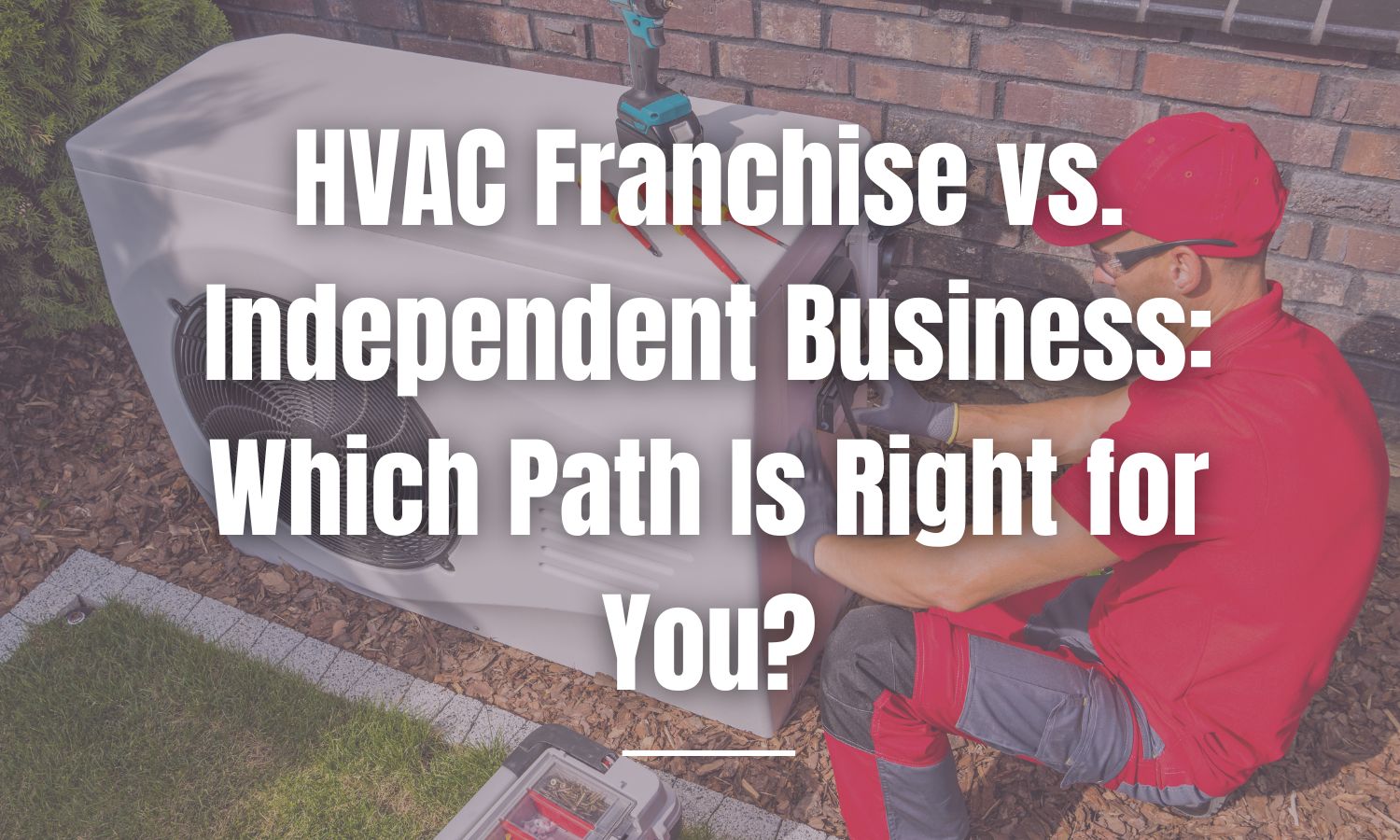If you’re ready to break into the HVAC industry or expand your existing skills into business ownership, you’re likely considering whether to buy an HVAC franchise or independent business.
Buying an HVAC franchise can offer a structured path to success. Instead of starting from scratch, buying into an HVAC franchise allows you to operate under a recognized brand with built-in support, marketing resources and proven business strategies.
However, buying an existing independent business might also be the right move for you. A successful independent HVAC business worth buying will also already have a strong customer base.
Conversely, when buying a franchise, you’ll have to establish your own customer base. Additionally, you’ll lose all autonomy in purchasing an HVAC franchise in following your franchisor’s rules—removing the ability to be your own boss. In some instances, there may even be fees associated with it.
Both paths offer the chance to be your own boss and build a profitable future—but they come with different benefits, risks and responsibilities. This blog will break down the key differences to help you decide which model aligns best with your goals, resources and experience.
Buying an HVAC Franchise
First, let’s talk about the meaning of a franchise. Simply put, a franchise is when a business owner pays both upfront and ongoing fees to license the brand name and supporting resources of a parent company.
If you’re looking to start a new business during a volatile economy, then buying an HVAC franchise might be the right choice for you. Since HVAC franchises have a stronger financial backing, there’s less risk to you. Likewise, even if you already own an HVAC business, joining an HVAC franchise is a great option if you want to expand your service offerings or service area.
Typically, franchises support you by:
- Granting licenses to franchisees
- Licensing operations to owners, including products, branding and knowledge
Let’s talk about the main pros and cons of buying an HVAC franchise:
Pros
1. Established Brand Recognition
Building a trusted brand takes years of marketing, customer service and word-of-mouth referrals. However, by joining an HVAC franchise, you immediately benefit from the credibility and reputation of a well-known brand.
2. Comprehensive Training and Support
Franchisors often provide extensive training programs and ongoing support, equipping franchisees with the necessary skills and knowledge to run the business effectively. This support can be invaluable, especially for those new to the industry. Businesses with structured training programs see a 24% higher profit margin compared to those without.
3. Proven Business Model
Franchises offer a tested and refined business model, reducing the trial-and-error period typically associated with startups. This can lead to quicker profitability and operational efficiency.
Fact: Franchise businesses typically save 15-20% on operational costs due to group buying power.
Cons
1. High Initial Investment and Ongoing Fees
Franchise ownership often requires substantial upfront costs and continuous royalty payments, which can impact profitability. These financial commitments may be higher than starting an independent business.
2. Limited Operational Freedom
Franchisees must adhere to the franchisor’s established systems and guidelines, leaving little room for personal innovation or deviation. This can be restrictive for entrepreneurs who prefer autonomy.
3. Profit-Sharing Obligations
A portion of the revenue must be shared with the franchisor through ongoing royalties, which can affect the overall earnings of the franchisee. This arrangement may limit financial flexibility.
Expert Tips for Buying an HVAC Franchise
Owning an HVAC franchise is a significant decision that requires careful consideration and strategic planning. While franchising offers the advantage of operating under an established brand with proven systems, it’s essential to thoroughly assess various factors to ensure alignment with your personal and professional goals.
1. Do Your Due Diligence
Investigate the franchisor’s track record, financial health and the performance of existing franchises. Understanding the franchisor’s reputation and stability is crucial before making a commitment.
2. Assess Market Demand
Evaluate the local market to ensure there is sufficient demand for HVAC services and that the franchise’s offerings align with community needs. This assessment helps in determining potential profitability.
3. Understand the Franchise Agreement
Carefully review all terms and conditions outlined in the franchise agreement, paying close attention to fees, territorial rights and exit strategies. Seeking legal counsel can aid in comprehending these details fully.
Buying an Independent Business
Opting to purchase an independent HVAC business, on the other hand, allows for complete control over operations and the opportunity to build a unique brand. This path may appeal to entrepreneurs who value autonomy and have a clear vision for their business. Additionally, buying an existing independent business can provide immediate access to an established customer base and operational infrastructure.
Pros
1. Operational Autonomy
Owners have the freedom to make decisions regarding services, pricing and business strategies without external constraints. This flexibility enables tailored approaches to meet specific market demands.
2. Potential for Higher Profit Margins
Without the obligation to pay franchise fees or royalties, independent business owners can potentially retain more of their earnings, leading to higher profit margins.
3. Creative Branding Opportunities
Entrepreneurs can develop and establish their own brand identity, allowing for personalized marketing strategies and a unique market presence. This individuality can differentiate the business from competitors.
Cons
1. Building Brand Recognition
Establishing a new brand requires significant time and effort. Unlike franchises that benefit from immediate brand recognition, independent businesses must invest heavily in marketing and customer engagement to build a reputable name in the market.
2. Limited Support and Resources
Independent business owners may lack access to the comprehensive training programs, marketing materials and operational support that franchisors provide. This absence can make navigating industry challenges more demanding and may require seeking external resources or mentorship.
3. Higher Risk Exposure
Without the backing of an established system, independent businesses may face greater financial and operational risks, especially during economic downturns. The absence of a proven business model means that success relies heavily on the owner’s decisions and market conditions.
Expert Tips for Buying an Independent HVAC Business
Purchasing an independent HVAC business can be a strategic move for entrepreneurs seeking to enter the HVAC industry. Unlike starting from scratch, acquiring an existing business offers immediate access to an established customer base, experienced staff, and operational infrastructure. However, this path requires thorough evaluation and planning to ensure a successful transition and long-term profitability.
1. Evaluate Business Performance
Conduct a thorough analysis of the business’s financial statements, customer base and market position. Understanding the company’s historical performance and future potential is crucial for making an informed purchase decision.
2. Understand the Local Market
Research the local HVAC market to assess competition, customer demographics and service demand. This knowledge will help in formulating effective business strategies and identifying growth opportunities.
3. Develop a Robust Business Plan
Create a detailed business plan outlining your vision, operational strategies, financial projections and marketing approaches. A well-structured plan serves as a roadmap for success and can assist in securing financing if needed.
HVAC Franchise vs. an Independent Business
Which Should You Choose?
The decision between purchasing an HVAC franchise and starting an independent business depends on your personal goals, resources and risk tolerance.
Franchises offer brand recognition, established systems and support but come with higher costs and less operational freedom.
Independent businesses provide autonomy and potentially higher profits but require building a brand from scratch and navigating challenges without franchisor support. Carefully weigh the pros and cons of each option in relation to your business objectives and capabilities.
The #1 Expert Tip for Success
Regardless of the path chosen, leveraging advanced HVAC software like FieldEdge can significantly enhance operational efficiency and customer satisfaction. FieldEdge offers comprehensive solutions tailored to the needs of both franchisees and independent HVAC businesses, streamlining processes such as dispatching, invoicing and customer management.
FieldEdge provides a suite of features designed to optimize HVAC operations, including:
- Real-Time Dispatching: Efficiently assign and monitor technician schedules.
- Mobile Accessibility: Enable technicians to access job details and update statuses on the go.
- Integrated Invoicing: Streamline billing processes with seamless QuickBooks integration.
- Customer Management: Maintain detailed customer records to enhance service delivery.
With industry-leading features like these, it’s easy to see why the most successful HVAC companies choose FieldEdge. See for yourself why FieldEdge is the best choice. Set up a free demo today!
HVAC Franchise vs. Independent Business: Make the Best Choice
Deciding between launching an HVAC franchise or establishing an independent business is a pivotal choice that hinges on your personal goals, financial resources and desired level of autonomy.
Franchises provide the advantage of operating under a recognized brand with established operational systems, which can lead to a quicker market entry and potential customer trust. However, this path often involves higher initial investments and adherence to franchisor guidelines.
However, starting an independent business offers complete control over operations and the flexibility to innovate, but requires building brand recognition from the ground up and navigating the market without the support structure a franchise provides.
Carefully evaluating the pros and cons of each option will help you align your decision with your entrepreneurial vision and business objectives.




